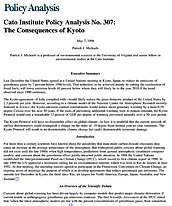Last December the United States agreed at a United Nations meeting in Kyoto, Japan, to reduce its emissions of greenhouse gases by 7 percent below 1990 levels. That reduction, to be achieved mainly by cutting the combustion of fossil fuels, will lower emission levels 41 percent below where they will likely be in the year 2010 if the trend observed since 1990 continues.
The Kyoto agreement–if fully complied with–would likely reduce the gross domestic product of the United States by 2.3 percent per year. However, according to a climate model of the National Center for Atmospheric Research recently featured in Science, the Kyoto emission-control commitments would reduce mean planetary warming by a mere 0.19 degree Celsius over the next 50 years. If the costs of preventing additional warming were to remain constant, the Kyoto Protocol would cost a remarkable 12 percent of GDP per degree of warming prevented annually over a 50-year period.
The Kyoto Protocol will have no discernible effect on global climate–in fact, it is doubtful that the current network of surface thermometers could distinguish a change on the order of .19 degree from normal year-to-year variations. The Kyoto Protocol will result in no demonstrable climate change but easily demonstrable economic damage.

This work is licensed under a Creative Commons Attribution-NonCommercial-ShareAlike 4.0 International License.

